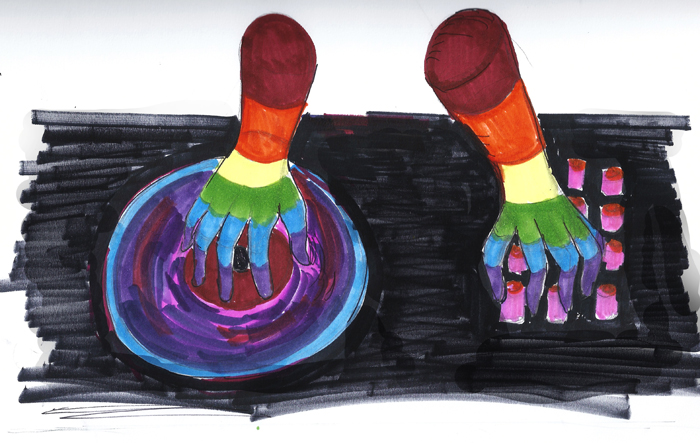There is a distinct lack of diversity in the Montreal electronic music scene. Many hopeful DJs feel the music industry is inaccessible because of the group of predominantly heteronormative males controlling it. Intersessions, founded in Vancouver by DJs Rhi Blossom and Chippy Nonstop, is a series of workshops working to change this lack of diversity by providing underrepresented demographics with DJ and music production classes. The project’s goal is to address the electronic music industry’s remarkable gender and sexuality based imbalance by providing inexpensive classes for people on the LGBTQIA2S+ spectrum.
On Sept. 19, Montreal’s first production workshop was hosted at Outro, a local company that provides creators with access to free artist-to-artist samples and loops. DJs Blossom and Maddie Ross led the workshop in Outro’s studio space. For the first portion of the evening, two local producers gave a tutorial on the respective production tools that they use: JaymieSilk on FL Studio, and Valeda on Ableton. Attendees were encouraged to follow along on their laptops, and could come to the event early if they needed help downloading the software. I had never produced music before—the case for about two-thirds of the attendees—and found this a little overwhelming. However, the point of the class was not to make us pros, but to give us a foundation for doing our own exploratory work using the software. Following their instructions, attendees were given a chance to play around with the software and ask questions, before the panel discussion that would close the night.
The panel discussion, which centered around the two artists’ experiences, was the most interesting part of the workshop. It began with Blossom asking Jaymie Silk and Valeda how they started making electronic music. Both artists revealed that they are predominantly self-taught, and praised YouTube as a great place to learn. They emphasized that expensive equipment is not necessary to make music, and that they still rely heavily on creating using their laptops. Silk spoke of “a new generation of producers” who are self-taught like them and less concerned with the formal techniques of production, but still able to create really interesting music. Both artists are grateful for the large community of DIY music producers in Montreal which they have become a part of.
Valeda and Silk then discussed the issue of tokenization—a problem that many of Montreal’s local DJs continue to face. Silk recalled being put on a lineup that had little in common with his sound, other than the fact that all of the DJs were black. Valeda recounted playing some bigger venues, where it seemed like the people who booked her didn’t even like her music, but needed a girl for their lineup. It is an inner struggle when confronted with these situations. The exposure is still valuable, and the artist needs to make money, but it can be obvious that they are getting booked just to fill a quota or to project an image.
Finally, there was a fruitful discussion about cultural appropriation and the exploitation of certain genres. Jaymie Silk, who comes from the ballroom scene—a ball culture that originated in Harlem as a place of refuge from societal oppression of sexuality, race, and gender—explained that many DJs will make ballroom style house music, while not acknowledging the style’s complex and important history. The same goes for the current trend of appropriating Jamaican culture by sampling dancehall beats. In order to pay respect to the music they sample, DJs need to be familiar with the history behind the genre they work within. Artists should ask themselves whether they truly care about the music they’re sampling.
Power imbalance within any given context must be assumed, rather than overlooked. As much as we love to place our Montreal music scene on a pedestal of progressivism, oppressive practices continue to obstruct equality and fairness for all. Events like Intersessions are integral in shaping the musical culture of the future—one that is more responsible and accessible.









